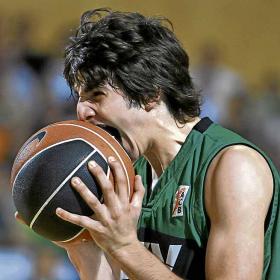March 2006:
"Steven, we really liked your column. Would you be interested in writing one for us every week? We’re thinking of calling it Sandberg On Sports..."How could I have ever imagined the amazing future I had in store?
It seems like such a long time ago that I was sitting in my freshman dorm at Gonzaga reading those words. I had recently watched the 2006 Gonzaga Bulldogs drop a heartbreaker to UCLA in the Sweet Sixteen, and wrote a column about the mood in my dorm. I submitted it to the school paper, “The Gonzaga Bulletin,” and they liked it so much they brought me on board full-time.
At first I was just happy to be providing a different perspective within the pages of the newspaper, and wrote about things like why April is a good month for baseball, or Andre Agassi’s final match. But as I grew older and became more involved with the school, I started to use my space to highlight or comment on things that mattered to people. At the beginning of my third year, my former editor, Tim Bross, challenged me to dive in and take a stand on important topics instead of sitting on the sidelines. If something needed criticizing, then criticize it, but if something was worthy of praise, praise it. As a result, I became a better writer, because through my work after Tim’s challenge I realized that a good columnist can’t be a blatant homer or overly-critical; they just need to write how they truly feel. No gimmicks, no phoned-in topics, no attempts to stir up controversy; just write what you really mean, and mean what you say.
That column became my identity; a large part of who I was. Other students got involved with Gonzaga by joining service groups, devoting themselves to their studies, or other activities. I got involved by commenting on Gonzaga through the lens of sports, and having those thoughts printed in the student newspaper. There were always stories to tell, people who deserved recognition, or acts that should be praised or condemned, and my goal was to use my column to help the Gonzaga community by allowing it to be aware of these stories.
I thought Josh Heytvelt and Theo Davis deserved a second chance. I thought that the women’s basketball team’s response to Rachel Kane’s knee injury was inspiring. I thought that certain actions by some students in the Kennel Club were getting out of line. People may not have always agreed with me, but that’s not the point. My goal was to use my opinion in order to get others to look around and decide for themselves.
At Gonzaga, my column helped define me.
As I began this summer 2009, I hadn’t been a full-time columnist in over a year. This Web site, which had been used for republishing my columns from the Bulletin, had gone largely unused for quite some time. But as the days of summer rolled on, and my search for a television reporter job took longer and longer, I found myself feeling empty inside. As each day went by without a job offer, I became more and more frustrated. I needed something to help fill the void I was feeling during this transitional period of my life.
So that’s when I starting writing again. My columns became a blog. And I realized how much I missed doing this.
Days, weeks, and months went by without a job, but I wasn’t as disheartened as I was before, because I had devoted myself to this blog, trying to make it the best that it could be. My blog became a sanctuary for me during a time when so many things were still uncertain in my life. With every post, column, or anecdote, I was having a blast, and it was all coming back to me how important my sportswriting was to the kind of person that I am. With a sense of purpose, I pushed on, trying to write something every day, but more importantly, having fun with it all. Writing here for the past few months helped me find some peace, and was an outlet for my creativity during a time when I needed it most. I’ve had so much fun.
But sometimes life gives you a pitch you weren’t expecting: I finally found a reporter job.
I was recently hired to be a news reporter for KDRV Newswatch 12 in Medford, Ore., and I couldn’t be more excited. After months of searching, I’ve finally found a job, and I’ve finally become a reporter
(for the record, it’s in NEWS, not SPORTS. You don’t know how many times I’ve had to clear that one up with friends and relatives. And yes, I do know things that aren’t sports-related). I’m going to be moving to Medford soon, and within a few months my fiancé will finish her student-teaching and join me there, when my professional and personal lives will finally come together and I begin a new life.
It’s everything I’ve wanted, but with a drawback. A full-time reporting gig in a new city plus wedding plans and future marriage doesn’t leave me much time for blogging.
Unfortunately, this site is going to take a bit of a hit.
Wait! Don’t take me off your bookmarks just yet! And don’t stop checking for updates! I’m not stepping out of the game completely, but there is going to be a significant drop-off in the amount that I write. With a job and a burgeoning new life, I won’t be able to write as frequently as I used to.
Invariably in life, things change. It’s a part of growing up. For me, I’m starting a career and, soon, a family. I’m going to devote myself completely to those things. That means that other aspects of my life, including my writing for this blog, are going to change.
That being said, I want to let you know that I am determined to continue with this site, even in a small way. I may only write once a week or less, but I am still going to write. My tone, subject matter, and excitement won’t change one bit, only the frequency of my updates.
As Tom Hudson confusingly once said “I’m saying so long. But I’m still going to be around.”
So now I want to take this opportunity to say thank you to the people who helped me achieve all the success I’ve had, both in television and in sportswriting.
First, this Web site wouldn’t even be here without Travis Lucian, who encouraged me to cut costs by taking my stuff to Blogspot instead of wasting money on a domain name. I owe you big time, buddy.
To all of GUTV, for giving me the best four years of my life working in that studio. Dan Garrity, thanks for always believing in me despite all the odds. Phil Taylor, thank you so much for all of the perspective and insight you gave me when I was sitting in your office. Mike Lavelle, thanks for pushing to get more basketball games for the GUTV remote crew. And a big thanks to all of the shooters I’ve worked with, who made me look good enough to get a job. James Churchill, Nate Coombs, Sebastian Robertson, Dee Phillips, Dave Heil, Brad Gowing (WSU), Megan McGovern, and more.
To Tony Schick, whose passion for journalism is unmatched. We used to joke that the two of us were like Woodward and Bernstein, but really he was both wrapped up into one package.
To Kevin O’Brien, a constant source of inspiration and laughs. Working with you this summer was definitely a highlight. You’re one of the most talented writers I have ever had the privilege of working with. In Tony’s words “your sensual eloquence makes readers blow a load.”
To Tom Miller, Susan English, and John Kafentzis, whose advice and copy editing skills I’ve sorely missed since I’ve graduated.
To Dave and Ben of Blazer’s Edge. You write my favorite blog on the Web, and seeing you link to my Pargo article was one of my biggest thrills of the summer.
To my parents, who have read every single one of my columns since I was in high school, and always encouraged me to try for new heights. It meant so much to me, because I couldn’t have done it without your love and support.
To my fiancé Amanda, who listened over the phone as I read her the rough drafts of all my columns. Whenever I couldn’t find the right word to finish a thought, you could always find one for me. I can’t thank you enough for sticking by me despite all my madness.
And finally, I have to thank You, my readers. Your support and enthusiasm for my work continually inspired me to be my best. In the past, I had always joked that I had “about three or four” devoted readers, while secretly knowing that I had less than that. But these past few months, I was shocked at the response this blog was getting. Sure, compared to other blogs it was small, but to me, seeing people comment on articles or send me Facebook messages about a post meant the world. I couldn’t have done all of this without you, my readers. Thank you.
Now, if you’ve read this entire piece, then you’ll know that there’s no way I could ever tear myself away completely from my sportswriting. After all, it is a huge part of who I am. So I’ll still be around. I may not be here as often as I’ve been these past few months, but I’ll still be here. It just means that there may be a wider gap between posts. Still, I won’t let it change me, or what I’ve strived to do here since June. The circumstances may be changing, but it won’t change who I am.
I have no idea what the future has in store, but I look forward to seeing it all unfold as I enter the next phase in my life, and I hope you will all follow along with me. As my journalism professor Tom Miller says: "Stay tuned."
 In 2007, when I first saw the news that Greg Oden would miss his entire rookie season with a knee injury, I fell to the floor like I'd been shot.
In 2007, when I first saw the news that Greg Oden would miss his entire rookie season with a knee injury, I fell to the floor like I'd been shot.












